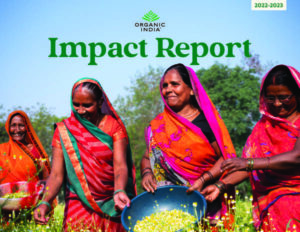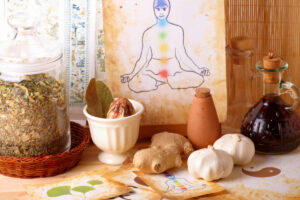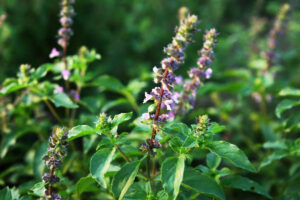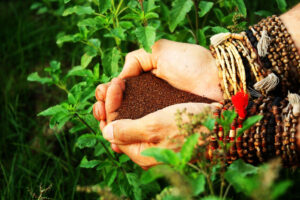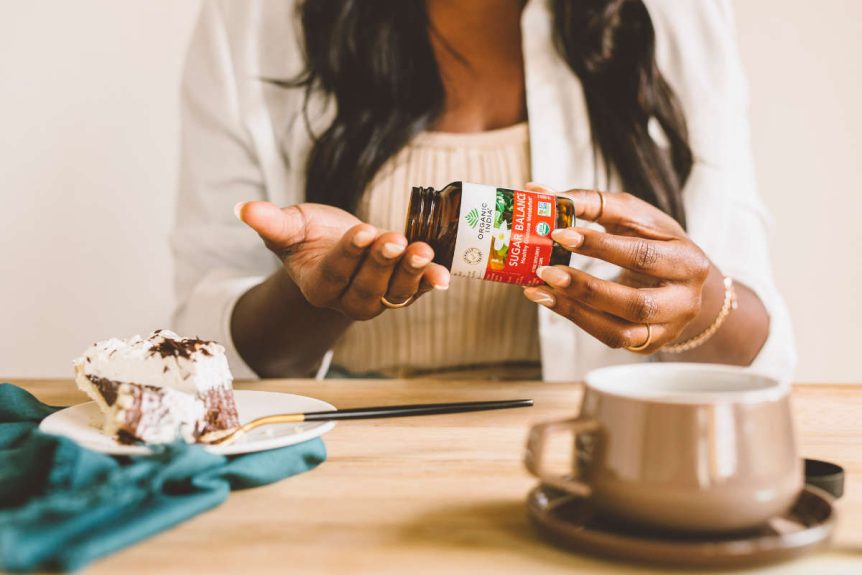Back
If you’re looking for natural ways to balance appetite and curb sugar cravings naturally, you are not alone.
Maintaining a healthy, balanced diet isn’t easy in Western culture, even for the very health-conscious.
From sugary coffee drinks and chocolate-covered snacks that help us beat the 3 o’clock slump to cultural pressures and addictive ingredients snuck into processed and even healthy-looking foods, it can feel like one needs superhuman willpower (or a magic pill) to maintain balance.
Fortunately, nature provides everything we need to help maintain balance in eating and appetite (no superhuman willpower or magic pills required).
Here, we share how to use specific Ayurvedic herbs plus dietary and lifestyle adjustments to curb cravings, balance appetite, support healthy sugar metabolism, and promote a healthy life.
An Ayurvedic Approach: Balance Appetite Naturally
In Ayurveda, imbalances in appetite are typically seen as an excess of Kapha dosha, which relates to body composition and weight management.
An overabundance of Kapha leads to the depletion of agni (digestive fire) and metabolic disturbance, ultimately leading to imbalances in appetite and the build-up of adipose (fatty) tissue.
An individualized diet and lifestyle program focused on foods, herbs, and movement that reduces and balances Kapha would be recommended (we’ll share some general examples of what this may look like soon).
Note: Other things can impact body composition and appetite and/or contribute to Kapha imbalance, such as aging, perimenopause, hormonal imbalances, stress and menopause. Talk to your Ayurvedic practitioner for individual recommendations.
Ayurveda looks at sugar cravings a bit differently.
A desire for sweet foods is considered natural and normal when related to whole, natural foods like grains, tubers, fruits, herbs and vegetables.
Sweet is one of the five tastes of Ayurveda, and it is considered grounding, nourishing and balancing. Sweet foods and spices are also staples in Ayurvedic dietary regimes.
Sugary and ultra-sweet foods, however, are not considered healthful as they aggravate all three doshas and deplete nutrients and vital force.
Sugar cravings may signal various issues according to Ayurvedic principles, including:
- A lack of naturally sweet foods in the diet, such as a low-carb diet
- Blood sugar imbalance
- Energetic imbalance
- Kapha imbalance
- A lack of the six tastes (Sweet, Sour, Salty, Bitter, Pungent, Astringent) from meals and snacks
- Nutrient imbalances
- Daily stress
- Sleep disturbance
Often, issues with appetite, body composition, and sugar cravings go together, necessitating the need for a holistic individual healing strategy.
Next, we’ll look at some general guidelines for supporting healthy appetite and curbing sugar cravings using Ayurvedic and Western principles.
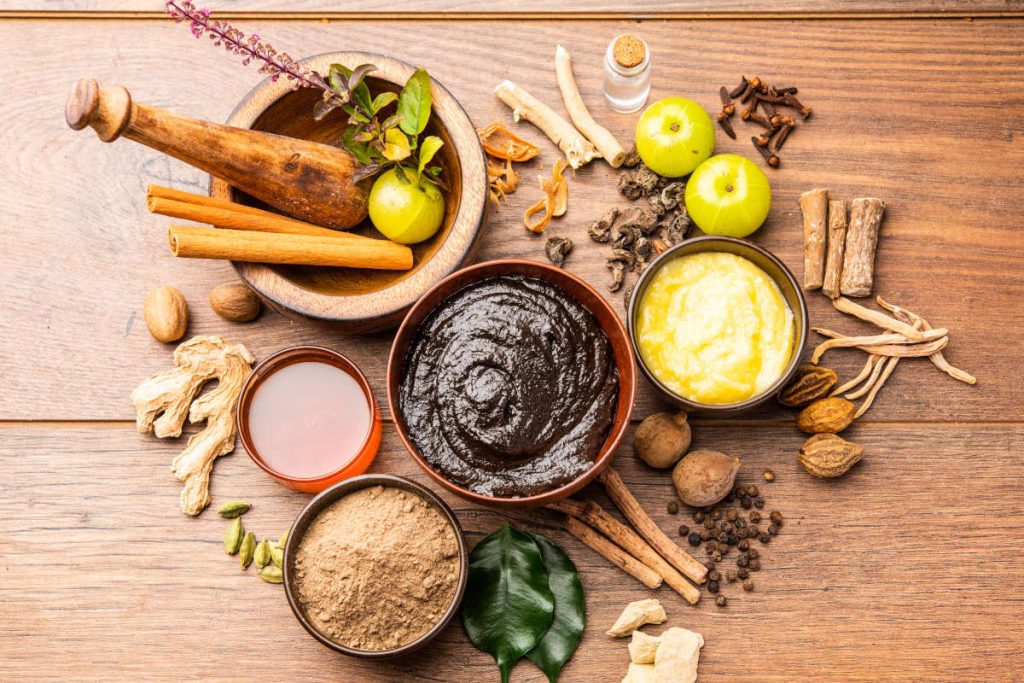
Dietary Tips to Balance Appetite and Curb Sugar Cravings
Kapha imbalance would signal the need for less Kapha-dominant foods.
It is difficult to give general recommendations here as some people will need to focus on more Pitta foods while others need more Vata, and others will need to reduce Pitta or Vata in certain seasons or cycles. (Talk to your Ayurvedic practitioner for individual recommendations)
However, here are some general guidelines to help reduce and balance Kapha energy, which can help rebalance appetite and body composition.
Dietary Suggestions
- Avoid sugary foods, including candy, chocolate, sodas, cakes, pastries, dried fruits, etc.
- Limit dairy, fried, and heavy or very rich foods.
- Focus on warm foods and liquids vs. cold to stimulate digestive fire.
- Eat adequate protein, but make it lean—either lean meats or beans/legumes.
- Focus on bitter, pungent, and astringent foods for digestion and lightness.
- Related reading: The Six Tastes Of Ayurveda Explained
- Be sure to include naturally sweet foods, too! Foods like whole grains, beans, sweet potatoes, squashes, cinnamon, basil, cardamom, and fennel will help naturally satisfy your sweet tooth.
- Do eat fruit, but avoid very sweet fruits in favor of more astringent, light fruits like pears, apples, grapes, and pomegranates.
- Avoid eating when you’re not truly hungry, but don’t wait until you’re starving, as this will lead to over-eating. Some practitioners recommend avoiding snacks between meals, but this may not work for everyone. Listen to your body and eat when you’re hungry, limiting heavy snacking between meals.
- Eat your meals at the same time every day. Routine helps normalize your rhythm and make you less prone to over-snacking.
- Practice mindful eating in a distraction-free atmosphere. Chew every bite thoroughly, meditate on the tastes and textures, and stop eating when you’re three-quarters full.
- Include warming spices, such as ginger, black pepper, and turmeric, to rev up digestive fire (Agni).
- Eat plenty of fiber from whole grains, vegetables, etc. Fiber naturally increases satiety, supports blood sugar balance, and promotes healthy elimination.
Finally, avoid excess. As mentioned above, the Eastern practice of mindful eating is so helpful as it takes the brain some time to catch up with the stomach.
Again, these are very general guidelines for Kapha imbalance. Talk with your Ayurvedic practitioner for individual recommendations.

Lifestyle Tips to Balance Appetite and Reduce Cravings
The lifestyle tips recommended for a balanced appetite in Ayurveda are similar to those recommended in Western medicine, including:
- Exercise daily. Ideally, a mix of cardio (walking, dancing, hiking, jogging, etc.) and weight-bearing exercises (yoga, weight lifting, pilates, etc.) will help maintain healthy blood sugar, support digestive fire, and make weight management much easier.
- Stay hydrated. Thirst can often be mistaken for hunger. Hydration is essential for clarity of mind, energy, and even healthy skin. Focus on warm beverages rather than cold ones.
- Get 8-9 hours of sleep every night. Lack of sleep can lead to sugar cravings and imbalances in appetite due to its effects on hunger hormones like leptin and ghrelin. Plus, when you’re sleepy, you’re more likely to reach for a quick energy-boosting sugar treat.
- Reduce alcohol. Alcohol breaks down to sugar, which can lead to more sugar cravings. It also interferes with sleep, energy, and hormonal balance, and is irritating to all doshas and should be reduced and/or avoided for optimal results.
- Reduce stress. Stress aggravates all the causes of appetite imbalance, Kapha imbalance, and sugar cravings. It also disrupts sleep, digestion, and hormonal balance. Exercise, yoga, meditation and/or prayer, spending time with loved ones, nature therapy, and adaptogenic herbs, like Tulsi and Ashwagandha, are all helpful for reducing stress.
Related reading: Home Pranayama Meditation: Breathing for Stress Relief

Herbs For Appetite, Satiety, and Sugar Cravings
For centuries, herbs have been used to help balance appetite, satiety, sugar metabolism, body composition, and even to manage sugar or other types of cravings.
Herbs are not considered cure-alls or stand-alone solutions but are given as part of a holistic approach to balancing Kapha energy, promoting normal blood sugar and metabolic function, reducing stress, supporting digestion and gut health, and maintaining optimal nutrition and satiety.
Herbs For Satiety Support
Many factors can impact our feeling of satiety including stress, food additives or chemicals, Kapha imbalance, lack of tastes in the diet, and mindless (vs mindful) eating.
The following supplements may help promote feelings of satiety naturally, so you can more easily stop eating when you’re two-thirds to three-quarters full.
- Amla: Also known as Indian Gooseberry, Amla is a superfruit with antioxidant qualities, and in its whole raw form is a trusty source of vitamin C. Amla also supports satiety by supporting digestion and creating lasting satisfaction. Amla may be recommended as a single herb or as part of the herbal formula Triphala, which we’ll discuss in the next section.
- Psyllium: This plant-based prebiotic fiber is widely used in supplements to promote normal elimination and boost fiber intake. And more fiber equals a greater feeling of fullness. It also makes a great addition to gluten-free and vegan baked goods.
- Green Tea: Research suggests the antioxidant activity of catechins in Green tea may help promote satiety, fat oxidation, and balanced appetite.
Organic India offers Regenerative Organic Certified® (ROC) Amla supplements and various psyllium fiber products, as well as a Tulsi Green Tea for mind body support.
Related reading: Amla Powder Benefits: Superfruit for your Wellness Ritual

Herbs to Help Curb Sugar Cravings
If sugar or other food cravings sabotage your efforts, consider the following herbs to help restore balance.
- Berberine: Berberines are a type of plant compound from the Berberidaceae family. Some examples of berberine-containing herbs include Goldenseal, Barberry, and Oregon Grape. Studies have shown that berberines may have multiple benefits on metabolism, including helping sugar and lipid metabolism, which may help control cravings and promote satiety and normal appetite. Although more research is needed, berberines have become a popular supplement for cravings and balanced appetite.
- Triphala: Triphala, or “the three fruits,” is best known for its positive effects on digestion. It’s also cleansing and tridoshic, meaning it supports balance of all three doshas, supports metabolic function, and helps with cravings. Triphala is often recommended for detox due to its cleansing and digestive-support properties.
- Turmeric: This warming spice has incredible antioxidant properties and has been shown to help support normal blood sugar, satiety (it has an astringent taste), lipid profile, and metabolic function. According to Ayurvedic principles, Turmeric is also believed to help reduce the build-up of toxins.
Explore Organic India’s Organic Turmeric and Triphala supplements.
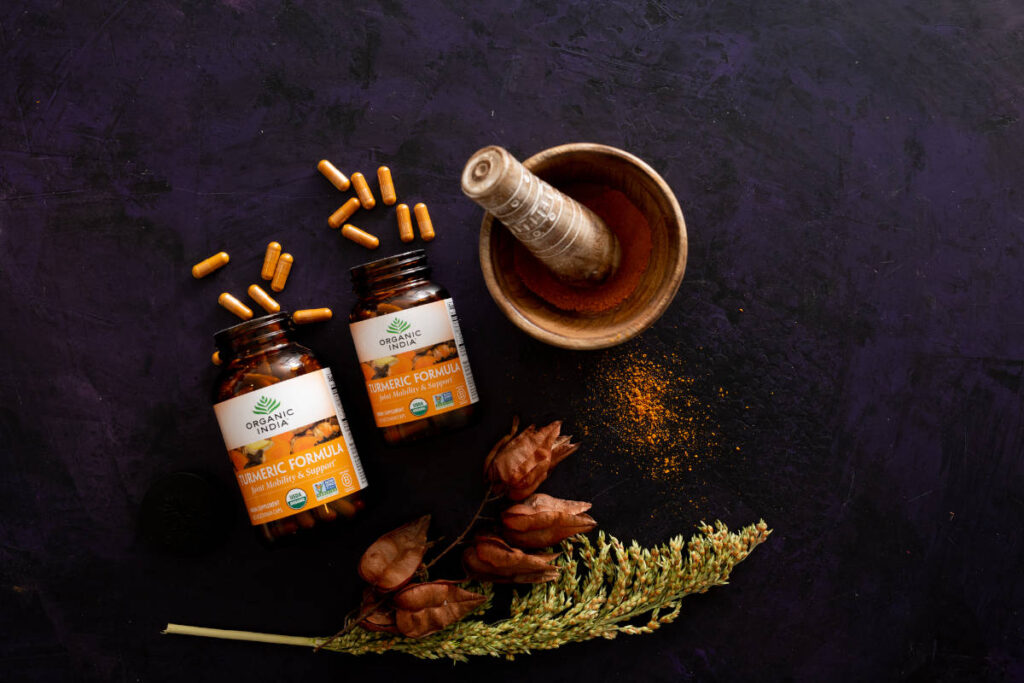
Herbs to Support Normal Sugar Metabolism
It’s well established that blood sugar dips and spikes can contribute to sugar cravings and overeating, even in healthy people.
The following herbs have been used in Ayurveda for centuries to help promote normal sugar metabolism, in addition to a supportive diet and lifestyle.
- Bimbi: Also known as ivy gourd, Bimbi is used extensively in Ayurveda and has been shown in studies to promote various aspects of healthy sugar metabolism.
- Ceylon cinnamon: In addition to its naturally sweet and spicy flavor (which can help cravings in and of itself), Ceylon cinnamon is well-known and has been studied for its beneficial effects on metabolic function and sugar metabolism.
- Madagascar Periwinkle: Also known as Sadabahar, this lesser-known herb is used extensively in traditional Ayurveda and African herbalism to help improve the healthy metabolism of sugar. Research suggests it works via its beneficial effects supporting the liver’s role in glucose metabolism.
Experience the synergistic power of Bimbi and Madagasgar Periwinkle in Organic India’s Sugar Balance supplement, or for daily maintenance, try Ceylon Cinnamon Capsule Supplements.
Related reading: 5 Amazing Herbs for Blood Sugar Support
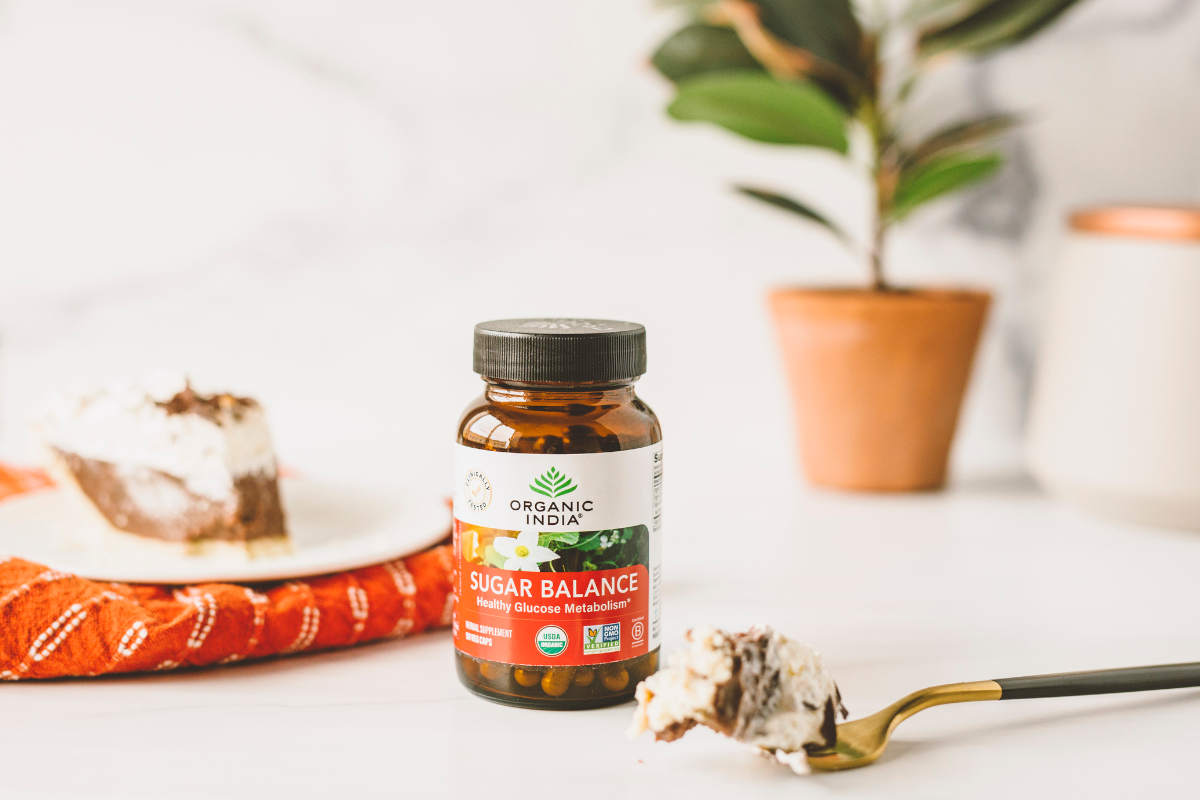
To Recap Ayurvedic Practices for Curbing Sugar Cravings and Balancing Appetite
We’ve covered a lot, so let’s recap:
- Ayurveda generally views imbalances in appetite and body composition as an excess of Kapha dosha, though other factors can contribute.
- Sweet cravings for whole, natural foods are considered normal and beneficial, but sugar cravings are not.
- Sugar cravings can stem from various factors, including stress, doshas imbalance, nutrient deficiencies or insufficiencies, a lack of naturally sweet food in the diet, and more.
- Diet, which may include reducing kapha-dominant foods and increasing light, astringent, fiber-rich, and warming foods, plays a key role in restoring a balanced appetite and quelling unhealthy cravings.
- Daily exercise is essential and should not be skipped, especially for those with dominant Kapha dosha.
- Various herbs can be used to promote satiety, support normal blood sugar, and curb sugar cravings. However, they are not magic bullets and must be taken within the context of a holistic program.
- As always, this information is intended to provide general guidance and should not be considered a substitute for medical care. Consult your Ayurvedic doctor or healthcare practitioner for individual recommendations.





